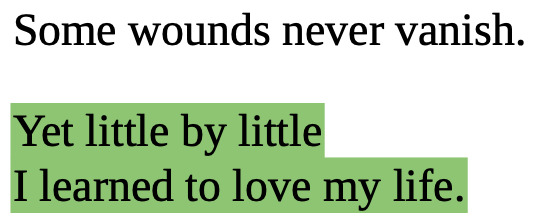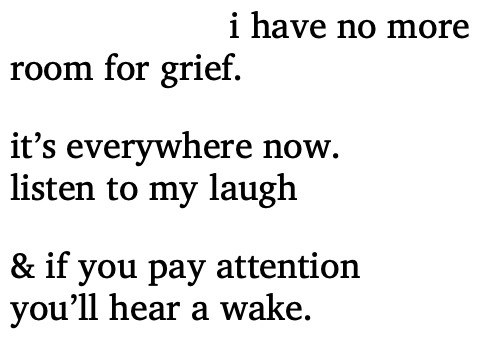this is where i come to feel things that i don��t have words for but other people always seem to. thank you poets
Don't wanna be here? Send us removal request.
Text
“I am at my loneliest when I have something to celebrate and try to share it with those I love but who don’t love me back. There’s always silence at the end of the phone.”
— Karen Finley, excerpt from “The Black Sheep” (via larmoyante)
4K notes
·
View notes
Text
“It’s impossible to want what I want and in the shape I want it, and share life with others besides. I had to know how to be alone and how to let so much wanting do its work, save me or destroy me …”
— Julio Cortázar, from “Hopscotch” (Pantheon, 1987)
306 notes
·
View notes
Text
“You can’t know how strong my feelings are. All things of myself I want to share with you. Sometimes it is hard to get through, but I always want to. Despite all my sickness, I have grown. In my growth I learned some important things. One of them is that I pick you. Not just that I need you (for I do) but that even without the need I can make a choice and the choice is you.”
— Anne Sexton, from “A Self-Portrait In Letters” (via violentwavesofemotion)
8K notes
·
View notes
Photo

Our third chapbook finalist is CAMERON AWKWARD-RICH for the manuscript, Transit. Check out (and share!) a sneak peek of the manuscript above, “What Returns” (previously published in The Bakery).
1K notes
·
View notes
Text
“it has been done and done and done to death sick of the suicides, sure and nature’s been done to death is there really anything more to be said about geese? ever? and please please no more poems about poems the only thing worse than poems about poems are poems about love I have committed my share I have done my time love always loses inevitably poems outlive the love so maybe the answer is to stick with the poems but not poems about suicide or geese or poems and especially not about love I admit I have a record in the past there was a time when I committed love poems but no more I have paid my debt to society and come back rehabilitated no more love poems, you came too late lover I’m sorry you took so long to come but you’re here just in time for global warming poems or meek shall inherit poems postmodern conundrum birdcage effervesce poems reader reception poems but no more love poems there are no more the first time you looked at me poems never a walking down not a do not pass go do not collect my lover’s eyes or even all my lovers’ eyes do not compare thee to a mission street walk smarting a shove shoulder into yours not a single motown you to morning, not a singing in the shower sweet morning sting of peppermint soap over our bodies never that first moment you looked at me peeked back over your shoulder leaning over your motorcycle that look smirk that smile wanted to fuck that smile right off your face put it back never a poem never white briefs not a tumble damp poem of no use crying over damp tumble dry bright white sheets no use crying over spilled ink now look what you’ve gone and done it’s committed to print I guess you’ll have to stay”
— Daphne Gottlieb, “sentenced," Kissing Dead Girls
294 notes
·
View notes
Text
The more you hoard a grief.
Why should she share? The world has not been generous with her.
— Mia Alvar, from “In the Country,” In the Country: Stories
289 notes
·
View notes
Text
For more than three decades, I took part in a variety of one-on-one therapies and group therapies. The aim was for me to share what was on my mind or in my life with a therapist who would respond with suggestions or critiques that would help fix me. Struggling with anorexia and anorexic thinking, I would, for instance, say I was fat. More often than not, I was told I was not fat; then the therapist would ask what I really thought, which was a mystifying question. I had just said what I really thought. From my therapist’s responses, I eventually came to understand that what I thought—I’m fat—was wrong, that the therapist didn’t understand or empathize with me, and that she was growing impatient.
Over the years, I began unconsciously to intuit what the therapist wanted me to say—I would talk, for example, about my specific day-to-day problems, such as what to eat, so the therapist could then feed me the culture’s sanctioned solutions to these problems. I want to be clear: I didn’t know I was doing this. I had so completely absorbed my many therapists’ reactions and responses to me that I had, in a sense, become trained in behaving how they wanted me to behave. Rather than working to discover what was happening below the surface of my reactions, beliefs, and thoughts, and thus gaining access to who I was and then learning to embody this person, I was becoming more and more skilled at intuiting what other people wanted or expected from me and meeting these expectations. What I was learning from my therapists I was also learning from the dominant culture: it was not okay to talk about how I felt about myself and my being in the world.
— Cynthia Cruz, from “Asylum,” Disquieting: Essays on Silence
580 notes
·
View notes
Text
“She is one of the most selfish people she has ever known, she thinks about this while swimming and after, on the beach, in her towel, shivering. It is an aspect of personality, hard to change. Generous gestures, when she attempts them, seem to swipe through the lives of others like a random bear paw, often making matters worse. And she finds no momentum in sharing, in benevolence, in charity, no interaction with another person ever brought her a bolt of pure aliveness like entering the water on a still morning with the world empty in every direction to the sky.”
— Anne Carson, from “1 = 1,″ The New Yorker
366 notes
·
View notes
Text

Aiskhylos tr. by Anne Carson, An Oresteia; “Agamemnon”
7K notes
·
View notes
Text

Mary Oliver, from “Hum Hum”, A Thousand Mornings
74K notes
·
View notes
Text








Tree roots following the pattern of concrete footpaths
130K notes
·
View notes
Text

Julia de Burgos, from Song of the Simple Truth: Poems; "That You Love Me In Green,"
13K notes
·
View notes





